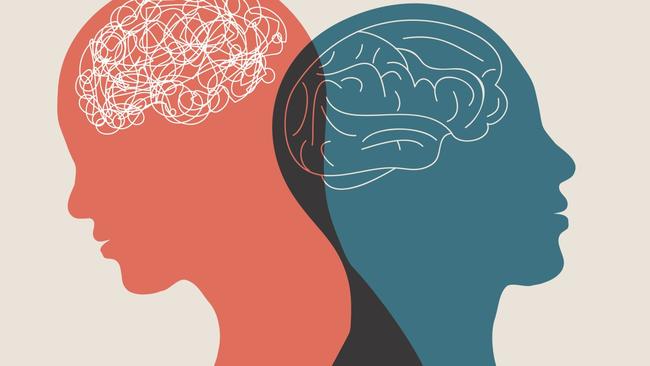Is it ADHD or nervous system dysregulation?
There’s a huge difference in how they’re treated, so getting an accurate diagnosis is essential.

Neurodivergence
Don't miss out on the headlines from Neurodivergence. Followed categories will be added to My News.
There’s no doubt that there is increasing awareness of ADHD online, but the symptoms may be mistaken for other illnesses. This is how you can tell which is which.
There has been increasingly more awareness about adults being diagnosed with Attention Deficit Hyperactivity Disorder (ADHD) over the past few years.
However, sometimes in therapy, patients learn that their symptoms are a sign of nervous system dysregulation from other illnesses or conditions.
Psychotherapist, Andrea Szasz, explains the similarities in symptoms, how to get an accurate diagnosis and gain the ability to self-regulate and control thoughts, and emotions.
Like what you see? Sign up to our bodyandsoul.com.au newsletter for more stories like this.
Many people at first think it's ADHD
Deborah* was in her late 40s when she began struggling with temper outbursts, insomnia, lack of concentration, anxiety and significant mood fluctuations. She started to use alcohol to medicate herself at times.
“At first, I thought my symptoms were just a sign that I was perimenopausal, but as the months rolled on, I began to think something else was going on,” she recalls.
It wasn’t until Deborah began to lose track of her thoughts in the middle of conversations and lost her car keys on a few occasions that she began to become increasingly concerned. Although these symptoms seemed somewhat new to her, she remembered having similar difficulties in her childhood and early teenage years. “After some reading I came across ADHD and decided to seek some help.”

Deborah began attending regular group therapy sessions at a treatment centre. It was here that she came to understand that she was not given many emotional regulation tools growing up, and in fact, had nervous system dysregulation.
“My mother was highly anxious and struggled to care for me when I was born, along with my two older brothers. Growing up, I also experienced terrible bullying in my early school years and constant teasing from my older brothers.”
Deborah has since learned some nervous system regulation skills and how to change the negative beliefs that drove her anxiety and intrusive thoughts.
Getting the correct diagnosis
ADHD is estimated to affect one in 20 Australians and is diagnosed in a number of different ways. There are dozens of characteristics and symptoms that need to be looked at by a healthcare professional. These include:
- Difficulty sustaining attention
- Trouble listening when spoken to directly
- Failing to follow through on tasks and instructions
- Exhibits poor organisational skills
- Avoids/dislikes tasks requiring sustained mental effort
- Loses things necessary for tasks/activities
- Easily distracted (including unrelated thoughts)
- Is forgetful in daily activities
- Fidgets with or taps hands or feet, squirms in seat
- Experiences feelings of restlessness
- Has difficulty engaging in quiet, leisurely activities
- Is “on-the-go” or acts as if “driven by a motor”
- Talks excessively and/or blurts out answers
- Has difficulty waiting their turn and interrupts or intrudes on others

Symptoms of nervous system dysregulation would include fluctuations in mood, feeling overly sensitive, irritable, and on the edge. One may feel easily overwhelmed and anxious, crave for comfort food, and have disturbances in their sleep.
People often find it hard to focus or concentrate and sometimes experience unexplained chronic pain or fatigue. They may also notice that their immune systems are weak and they are prone to recurrent infections or have gut issues and digestive dysfunction.
It’s essential to take a detailed biopsychosocial history and explore the possibilities of why these symptoms emerged to determine a diagnosis.
“There has been a significant increase in awareness about adults with ADHD over the past six months. Sometimes it can be difficult to establish right away whether it’s ADHD or nervous system dysregulation due to the similarities in symptoms,” says Dr Ashwini Padhi, psychiatrist at South Pacific Private. “Symptoms of nervous system dysregulation because of trauma or other less-then-nurturing experiences can be very similar to the diagnostic criteria of ADHD,” he adds.
Few people realise or understand that we actually learn how to regulate our nervous system and emotions via our relationship with our primary caregivers. “If there is a disruption in that relationship or our caregiver’s nervous and emotional system is dysregulated, that is what they pass on to us,” explains Dr Padhi.

“Nervous system dysregulation impacts the way we think, feel and behave, and we may respond disproportionately by either over or under reacting. It is often linked to our early attachments and unprocessed stress and trauma.”
It is worth exploring therapy and behavioural change first, like meditation, breathing, healthy nutrition and incorporating rest and play in our daily activities. If making changes in lifestyle and behaviour and processing the difficult or, at times, traumatic experiences in therapy do not improve the symptoms, you might be given the diagnosis of ADHD and medication to help relieve or minimise symptoms.
If you or someone you know is struggling, can reach out for help via Lifeline 13 11 14, Beyond Blue 1300 22 4636 or South Pacific Private on 1800 063 332.
Andrea Szasz is a psychotherapist and the program director at South Pacific Private - a leading treatment centre for mental health, trauma and addiction.
Originally published as Is it ADHD or nervous system dysregulation?


